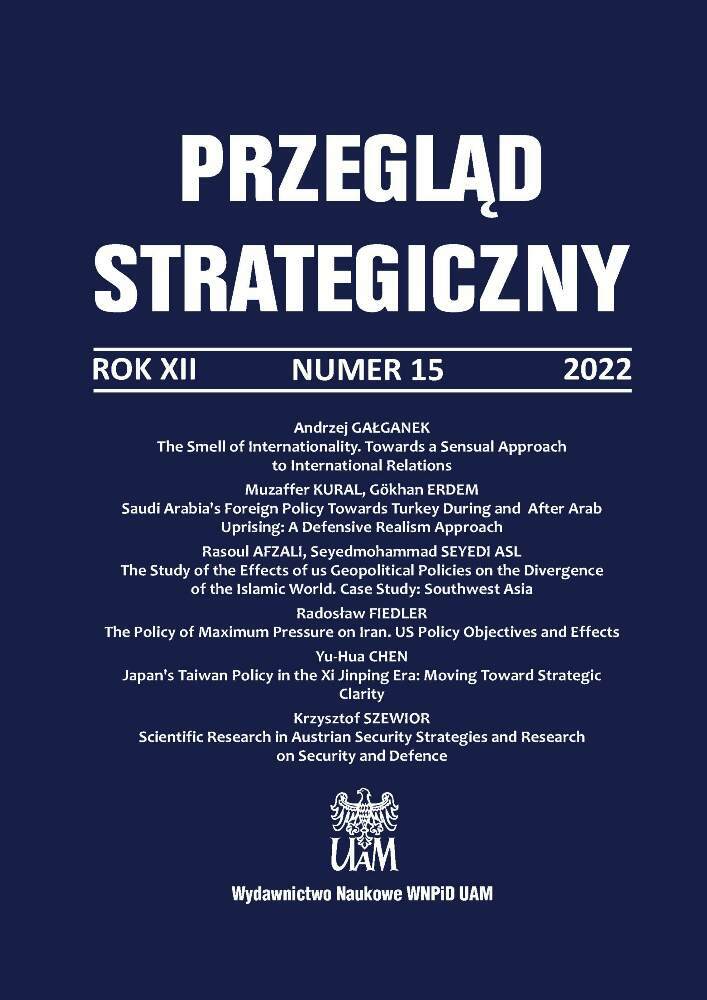Abstrakt
Celem artykułu jest analiza stosunków irańsko-izraelskich, które opierają się na mowie nienawiści i wojnie hybrydowej, ale w rzeczywistości można je sprowadzić do walki o władzę i dominację. Aby legitymizować swoje działania militarne przeciwko wrogiemu państwu, zarówno Iran, jak i Izrael muszą dokonać sekurytyzacji zagrożenia, co oznacza, że muszą przekonać opinię publiczną, że wrogie państwo stanowi zagrożenie egzystencjalne. Mowa nienawiści i agresywna retoryka są wykorzystywane przez oba państwa i są przejawem subiektywnej percepcji zagrożenia, a także stanowią narzędzie legitymizujące do uzasadnienia nadzwyczajnych środków przeciwdziałania zagrożeniom. Odwoływanie się do lęków i zagrożeń oraz metoda kreowania wroga to znane strategie polityczne zapewniające legitymizację władzy.
Bibliografia
Aburish S. (2004), Nasser: the Last Arab, New York.
Ben Meir Y., Bagno-Moldavsky O. (2013), The Voice of the People: Israeli Public Opinion on National Security, “Memorandum”, Vol. 126.
Benhorin Y. (2012), Netanyahu at UN: Red Lines Prevent War, http://www.ynetnews.com/articles/0,7340,L-4286353,00.html (19.12.2021).
Buzan B., Wæver O. (2003), Regions and Powers: The Structure of International Security, Cambridge. https://doi.org/10.1017/CBO9780511491252 DOI: https://doi.org/10.1017/CBO9780511491252
Cohen S. (2008), Israel and Its Army: From Cohesion to Confusion, Oxon.
Cordesman A. H. (2007), Iran, Israel and nuclear war, https://csis-website-prod.s3.amazonaws.com/s3fspublic/legacy_files/files/media/csis/pubs/071119_iran.is%26nuclearwar.pdf.
Dalton M. (2017), How Iran’s hybrid-war tactics help and hurt it, “Bulletin of the Atomic Scientists”, Vol. 73, No. 5. https://doi.org/10.1080/00963402.2017.1362904 DOI: https://doi.org/10.1080/00963402.2017.1362904
Decis H., Le Breton Ch. (2021), A new phase in the Gulf shipping threat?, https://www.iiss.org/blogs/military-balance/2021/09/a-new-phase-in-the-gulf-shipping-threat (10.01.2022).
Fassihi F., Gladstone R., Bergman R. (2021), Blackout Hits Iran Nuclear Site in What Appears to Be Israeli Sabotage, “The New York Times”, https://www.nytimes.com/2021/04/11/world/middleeast/iran-nuclear-natanz.html (23.01.2022).
Goldenberg I., Heras N., Thomas K., Matuschak J. (2020), Countering Iran in the Grey Zone, https://www.jstor.org/stable/resrep24223 (18.01.2022).
Grabowski W. (2020), Application of the Regional Security Complex Theory for Security Analysis in the Persian Gulf, “Athenaeum. Polish Political Science Studies”, Vol. 68(4). https://doi.org/10.15804/athena.2020.68.02 DOI: https://doi.org/10.15804/athena.2020.68.02
Grant G. (2008), Hybrid Wars, “Government Executive”, Vol. 40, No. 5.
Hendrix S., Rubin S. (2021), Israel pushing White House to demand more in Iran nuclear talks but avoiding confrontation with Biden, “The Washington Post”, https://www.washingtonpost.com/world/middle_east/iran-nuclear-deal-israel/2021/12/16/9fcf323c-5c5f-11ec-b1ef-cb78be717f0e_story.html (7.12.2021).
Hoffman F. G. (2007), Conflict in the 21st Century: The rise of Hybrid Wars, Arlington.
Israeli Public Opinion Polls: Attitudes Toward Iran (2013), https://www.jewishvirtuallibrary.org/israeli-attitudes-toward-iran (22.01.2022).
Kaye D., Efron S. (2020), Israel’s Evolving Iran Policy, Israel’s Evolving Iran Policy, “Survival”, Vol. 62, No. 4. https://doi.org/10.1080/00396338.2020.1792095 DOI: https://doi.org/10.1080/00396338.2020.1792095
Leonard S., Kaunert C. (2011), Reconceptualizing the Audience in Securitization Theory, in: Securitization Theory: How Security Problems Emerge and Dissolve, (ed.) T. Balzacq, London–New York.
Lupovici A. (2016), Securitization Climax: Putting the Iranian Nuclear Project at the Top of the Israeli Public Agenda (2009–2012), “Foreign Policy Analysis”, Vol. 12.
Parsi T. (2007), Treacherous Alliance: The secret dealings of Israel, Iran and the United States, New Haven.
Pelletiere S. (1992), The Iran-Iraq War: Chaos in a Vacuum, New York.
Shavit A. (2012) Former Mossad Chief: An Attack on Iran Likely to Foment a Generations-Long War, “Haaretz”, http://www.haaretz.com/weekend/magazine/former-mossad-chief-an-attack-on-iran-likely-to-foment-a-generations-long-war-1.461760 (4.12.2022).
Stephens B. (2019), The Man Who Humbled Qassim Suleimani, https://www.nytimes.com/2019/01/11/opinion/gadieisenkot-israel-iran-syria.html.
Yingst T. (2019), Jared Kushner says successful Mideast peace plan will be ‘Iran’s worst nightmare, https://www.foxnews.com/world/jared-kushner-says-successfulmideast-peace-plan-will-be-irans-worst-nightmare (14.01.2022).
Licencja
Prawa autorskie (c) 2022 Wojciech Grabowski

Utwór dostępny jest na licencji Creative Commons Uznanie autorstwa 4.0 Międzynarodowe.

